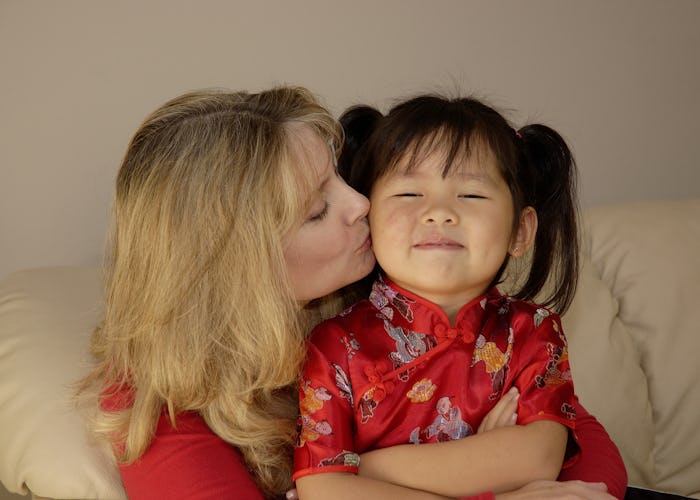Life

8 Times Society Expects You To Apologize For Being An Adoptive Mom
I don't think society intentionally wants adoptive moms to apologize for being existing, but it sure does feel that way sometimes. Adoptive moms are the minority, and like any minority we deal with a few inconveniences or things that just make us feel excluded. From medical forms to the way other moms sometimes react, there are times when society expects you to apologize for being an adoptive mom.
I have to say, though, that one big way adoptive moms aren't shamed in the United States is that their name, along with the adoptive father (if there is one), is put on the birth certificate of the adoptive child, meaning there will b moments when you aren't asked to explain that your child is adopted. This is a massive difference to where my partner and I previously lived, in Ireland, where adoptive children are essentially given an "adoptive birth certificate" and are required to use both their original birth certificate and their "new birth certificate," at all times.
I'm all for openness and disclosure when it comes to adoption, because I think the more we talk about it, the more it becomes normal and accessible (although the cost is still exclusive in that it's wildly expensive). Still, there are moments when us adoptive parents just don't want to stand out and explain that our child is adopted or have to write in the margins that, no, we don't have the medical history for our adopted child. Sometimes we just want to fly under the radar and be like every other mom.
When You're Filling Out Medical History Forms...
Some adoptive parents have the medical history for their children, but we don't have the luxury of any of that information. That means every time I have to fill out a medical form for my daughter, I have to write out that there just isn't any available. There's no box to tick for that, so I'm always stuck writing it out and explaining it further.
...And Checking Racial/Ethnic Boxes
Again, some adoptive parents know the racial or ethnic make-up of their adoptive children, but some do not. I make my best guess on those forms, but it's only a guess.
I remember that I don't want to put my daughter into a box she doesn't belong in or shortchange her from experiencing some of her racial identity, so sometimes I just check them all.
When You're Asked About Pregnancy And Birth
The first time I went to my (now beloved) mom's group, I left nearly in tears. My fellow moms were talking about their birth stories and didn't know my daughter was adopted. They asked about her birth and, of course, I had to explain everything on day one. I love sharing the story of how my daughter joined our family, but sometimes I prefer to do it on my own timeline.
When You Fill Out An Adoption Application
If you can believe it, even a recent adoption application asked us for medical history for our child. Still, no box to tick for "no medical history," so I scribbled in the margins again.
When You Point Out That Our Kids Don't Look Like Us
I had a class full of teenagers as I was filling in for another teacher the other day and they started asking questions about whether I had children. Like any proud mom, I whipped out my phone and showed them a few photos of my adorable toddler. They all responded with the appropriate, "She's so cute!"
However, when I turned to walk back to my desk, I heard one student whisper to another, "But she's black, right?" Ding, ding, ding! She is not the same color as me. So, here we go again. Let's have the conversation about adoption, now that you've brought it up.
When You Immediately Ask If We Can't Have Kids
Because it's none of your darn business why my partner and I chose to adopt. People are curious, as were those teenagers (whom I blame a little less than full grown adults), but it's still a personal question that I'd rather volunteer the information about rather than feel a little interrogated.
When You Say "I Could Never Do That"
Maybe not, but saying that makes me feel like some strange enigma you can't really understand. I also think, deep down, you could do that. You could decide that the way to start your family or to grow your family or to simply take part in humanity, might be to love a child you did not necessarily give birth to. Yes, it's a little complicated, but it's also totally easy. Love the kid with everything you've got, honor their identity and their past, and treat them as your own. It's something I wish we could all do more of with everyone around us, not just adoptive children.
When You Perpetuate The Idea That Adoption Ends In Disaster
Scrolling through my Facebook feed the other day, an acquaintance had shared an article about a disastrous failed adoption situation, in which the adoptive parents weren't able to control or raise their adoptive child. The acquaintance posted it with no explanation or comment on why she was sharing the article and, as I read it, I couldn't help feel so insulted to have the idea perpetuated that adoption ends in disaster. Guess what else sometimes ends in disaster? The choice to have biological children.
Is there an elevated risk with adoptive children? Absolutely, but children carry inherent risks. We will never be able to guarantee they will be perfect, and every parent should go into parenthood knowing that that is the case. Adoptive parents, especially those who adopt older children, should be aware of past trauma. However, society collectively shouldn't perpetuate the idea that adoption ends in disaster, especially not in tabloid format.